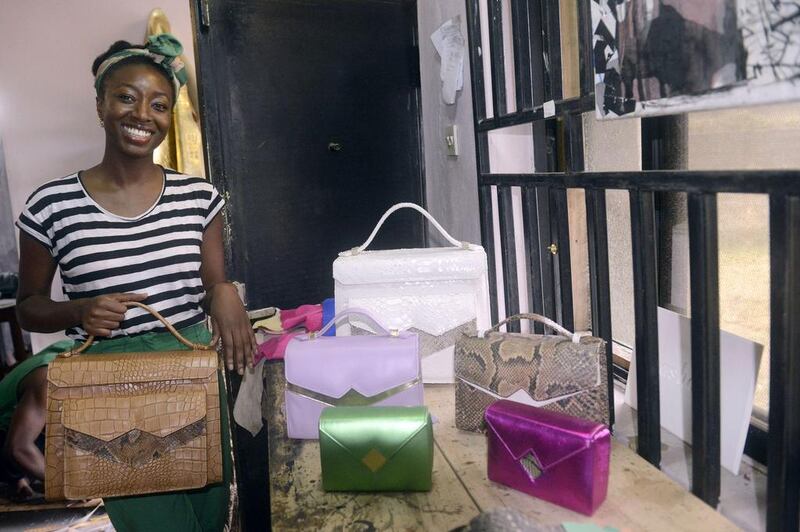Mention northern Nigeria and the first thing that may spring to mind is Boko Haram. Zainab Ashadu is hoping to change that – by selling designer handbags.
The Nigerian designer is the brains behind the Zashadu brand, whose modern, colourful creations use the ancient art of tanning and leather-dyeing from the north of the country.
“I think people like the story behind the bags,” the 32-year-old says at her bustling workshop in a working-class district of Lagos. “They like the fact that the bag has roots and origins.”
From the cramped premises in Festac, which buzzes with the sound of Singer sewing machines, a team of about half a dozen artisans make between 200 and 300 bags every year.
Ashadu’s parents were from the north, which these days is rarely out of the news because of the Islamist insurgency that has been raging since 2009. But the region has long been known for its high-quality leather, which the designer turns into clutch purses and handbags that sell overseas for between Dh675 and Dh3,595.
The leather comes from the north’s biggest city, Kano, and goatskin from the ancient northwestern city of Sokoto, as well as python skin from snake farms in the region.
Unlike European fashion houses, which import raw leather from Nigeria and then tan and dye it overseas, Ashadu decided to make use of the centuries of know-how passed on through the generations to the artisans in Kano.
“It is very important for me to work in a sustainable way,” she says. “I work with small families of tanners, the animals are traceable, we use vegetable dyes and other environmentally friendly dyes.”
The designer gets her inspiration from hours of hunting for bargains among the maze of stalls at the huge Mushin market in the Lagos suburbs.
It sells Nigerian leather offcuts and rejects, particularly from Italian fashion houses.
“It’s so vibrant … there’s so much leather available and sometimes the sellers have no idea of the quality of what they sell,” says Ashadu. “There’s antelope – that is very soft – there’s goatskin, sheepskin.”
The material she buys is turned into bags by her team, all of whom trained at a specialist school of leatherwork in the northern city of Zaria.
Ashadu is one of an increasing number of returning Nigerians, or “repats”, trying to build a business in their home country after years overseas.
She spent her early childhood in Lagos but was a teenager in London, where she worked as a model, actress and buyer, and studied architecture. She returned to Nigeria in 2010 and has had to adapt to a different ways of doing business.
“You need to be tough-skinned, adaptable and to have a great sense of humour,” she says. “Nigeria is a very hard place to ... do anything. It’s definitely very hard to run a business. But it’s more earthy. You feel like your feet are on the ground.”
Understanding and adapting to a different style of doing business is key to getting ahead in the country, with some overseas firms looking to invest in Nigeria put off by the red tape and logistical constraints.
Power cuts that often last more than 12 hours, for example, are a major problem and force businesses to invest in huge, costly electricity generators.
At Ashadu’s workshop, in a modest house belonging to her family, the power comes from a small generator.
What is important is adapting as much as possible to the way her employees work, rather than trying to force them to conform to what she learnt at the London College of Fashion.
Zashadu bags have won a small but loyal following locally. Private sales have been held in unexpected locations such as a hotel suite, with champagne and macaroons, and at an upmarket yacht club.
In the past year, the brand, which is marketed internationally online, has also established a presence at boutiques in London, Miami, Dublin, Johannesburg and, most recently, Paris.
The French designer Charlotte Ziegler, who sells Zashadu bags at the Franck et Fils department store, said she was intrigued by Ashadu’s unusual profile and its “sustainable luxury”. But she admits it was a risk.
“For 200 or 400 euros, people sometimes prefer to buy a product with a [recognised] designer label,” she says.
Ashadu remains confident, however, and knows that she’s tapped into a trend. “People love Africa, and Africa is something that is new in this way and people love to jump on bandwagons,” she says.
“And this one ticks all the boxes – it’s made in Africa, it’s beautiful-looking, it’s made sustainably, it’s international.”
artslife@thenational.ae





